Best evergreen shrubs – 10 perennial shrubs for backyard interest
Include some of the best evergreen shrubs in your garden for year round interest, structure and color
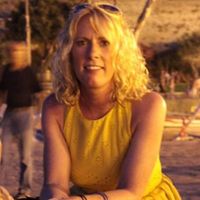

Every garden needs some elements that are constant so evergreen shrubs should be added to any planting scheme.
Evergreen shrubs work hard to earn their place in the garden. They add interest and structure whatever the month. Even better, they generally tend to be low maintenance options, which means little pruning is necessary. That makes them a favorite choice for garden ideas for backyards large or small.
Evergreen shrubs to add interest to your backyard
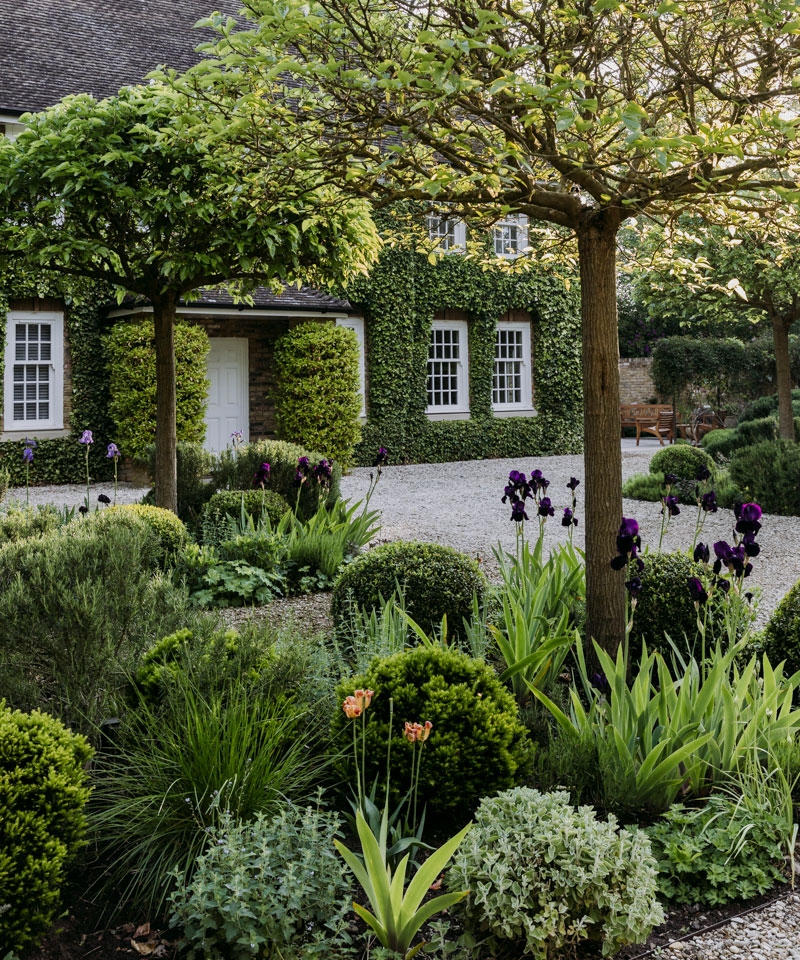
As well as landscaping with evergreens to add constant structure to your garden planting, some evergreen shrubs add color with beautiful blooms and berries; others are highly scented, so they add far more than just year round good looking foliage.
Mix them in with your planting of flowerbed ideas or let them take center stage.
Garden designer Kate Gould recommends using a high percentage of evergreen shrubs that hold their structure throughout the year. ‘Ideally, 50 to 70 per cent of the planting would be evergreen,' she says.
'A subtle tapestry of evergreen plants add a strong sculptural element,' says designer Emily Erlam.
1. Evergreen shrubs to add structure
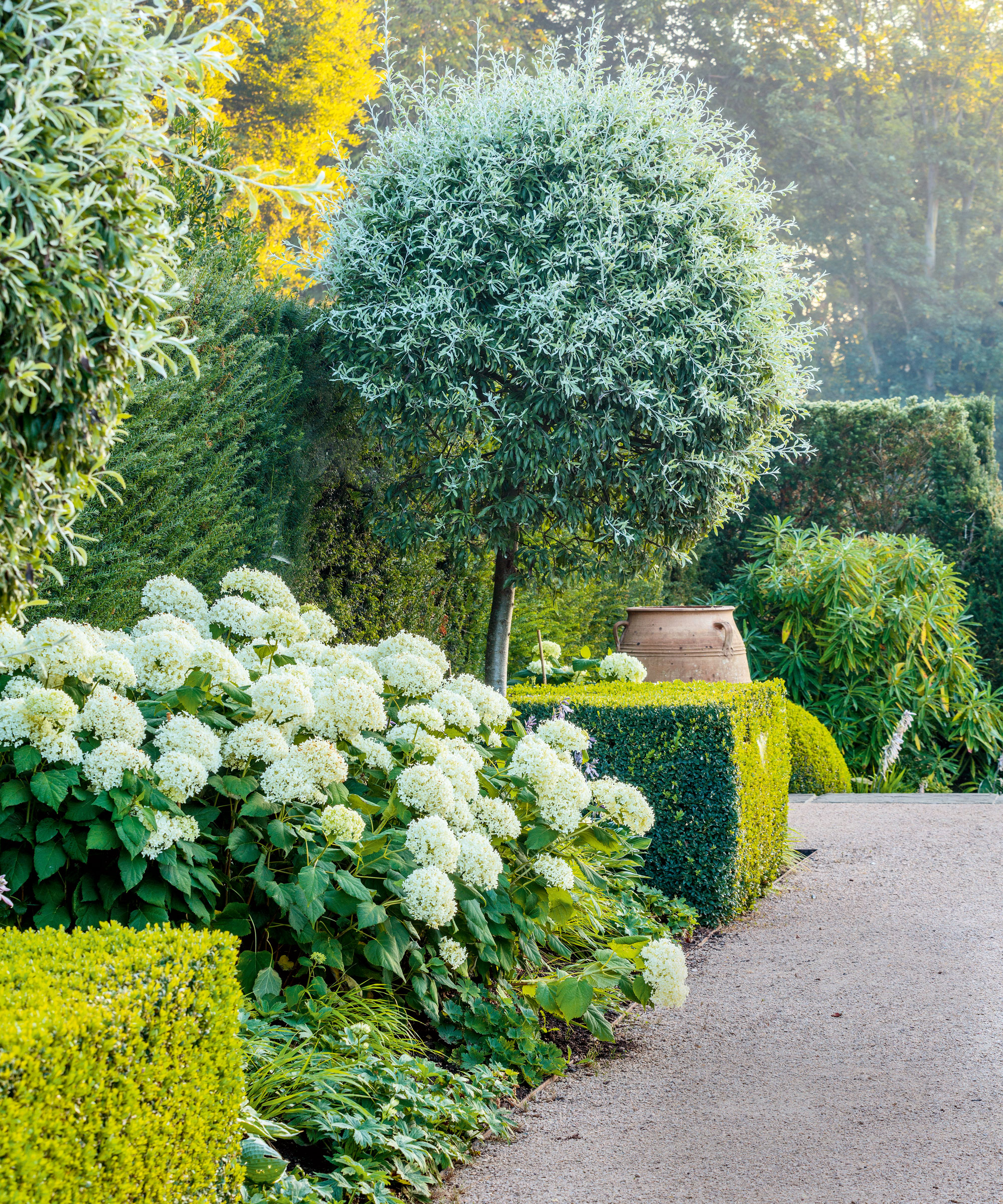
Every garden needs to have strong 'bones' and a large portion of the structure in gardens should be provided by the planting.
Design expertise in your inbox – from inspiring decorating ideas and beautiful celebrity homes to practical gardening advice and shopping round-ups.
‘It’s important to ensure that a garden has year round beauty,' says garden designer Tommaso del Buono.
‘This is where evergreen shrubs come into play. I use them to create the architecture to hang the whole garden on. I love box, a staple of Italian gardens, from the fresh green of its new growth each year in spring to its evocative scent. It makes the best fast growing hedges and any other shape for that matter.'
If you're wondering how to plan a garden, then Tommaso advises Japanese holly, iIex crenata, and Phyllirea angustifolia, narrow leafed mock privet, are useful to create structure.
'Yew, Taxus baccata, is the best for tall hedges and large topiary shapes, and I also like to use bay, Laurus nobilis, for the same purposes,’ he adds.
2. Evergreen shrubs to define spaces
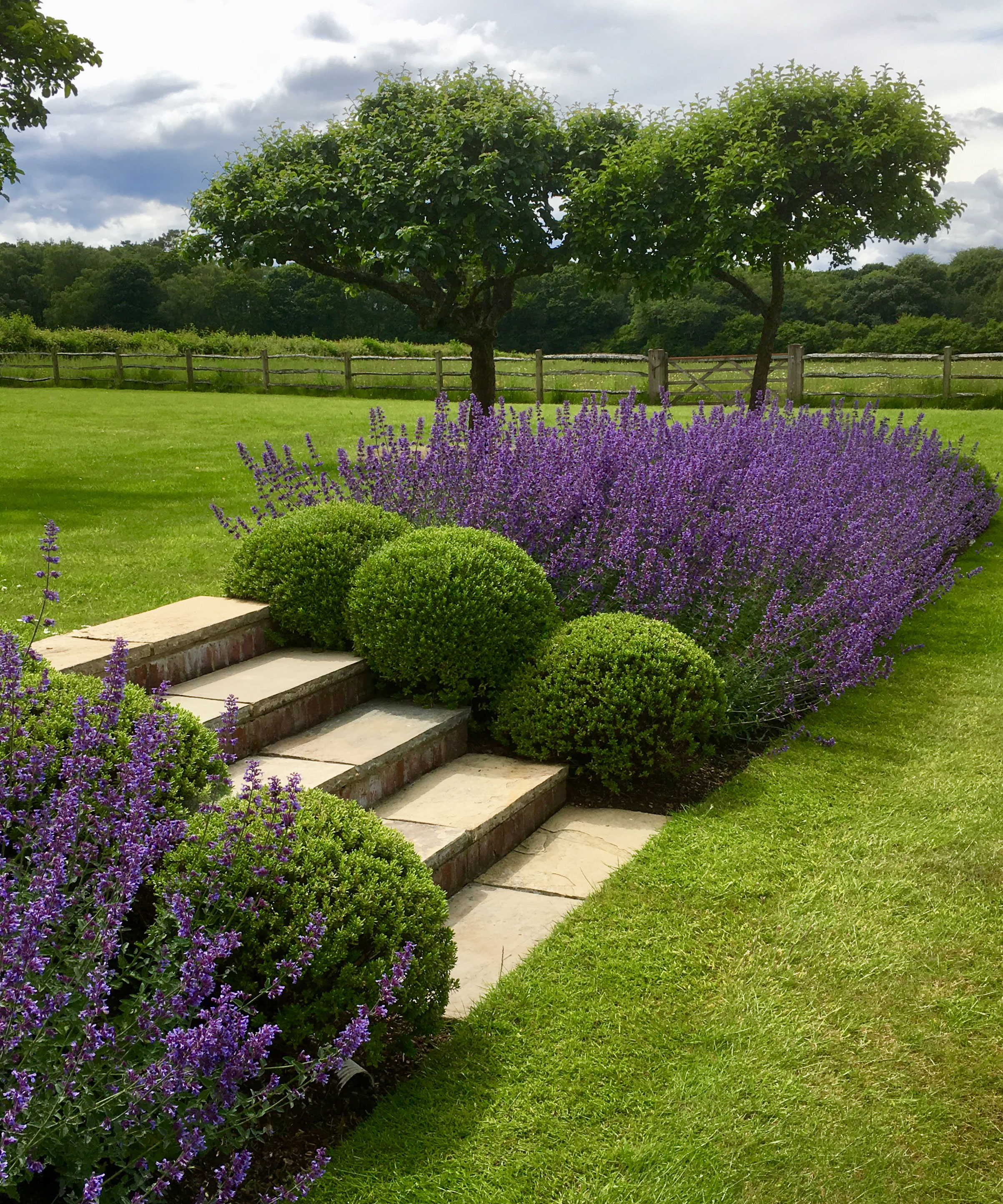
‘Alongside the vertical element of trees, and the textural and floral displays of grasses and perennials, a backbone of evergreen shrubs is important,' says RHS gold medal winner Rae Wilkinson.
Hedges, made from laurel, box, privet or cotoneaster, for example, can soften boundaries and accentuate the division between spaces and can be tiered to gradually relax the height of them while enhancing their lines.
'Smaller evergreen shrubs, such as lavender and hebe provide form, color and texture at the lower level. These work well for enhancing edges, softening level changes, or dividing connected spaces,’ Rae adds.
‘Hebe rakaiensis is one of our favourite small evergreen shrubs for hugging the sides of steps where a wall would be costly and not necessarily desirable, especially when combined with Nepeta ‘Walker’s Low’,' explains landscape gardener Debbie Roberts.
Clipped evergreen shrubs can also define spaces and routes.
'In my own garden, we have an avenue of clipped yew pyramids that diminish in size and spacing in order to create a false perspective and make the garden look longer,’ explains award winning designer Robert Myers.
3. Evergreen shrubs for garden borders
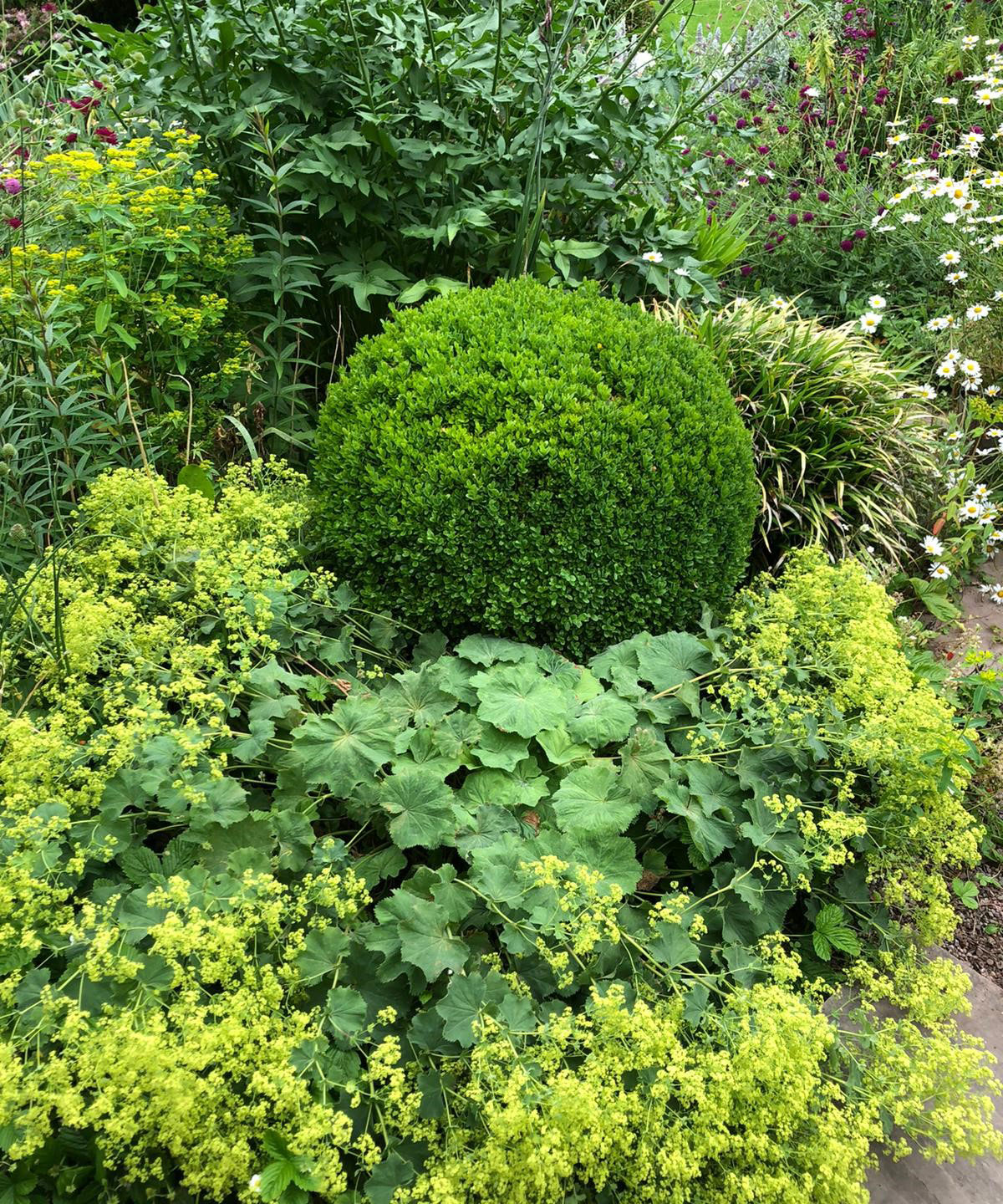
'Evergreen shrubs give year round interest and form in garden borders and beds, while successional perennials rise and fall around providing seasonal change, movement and interest,' explains garden designer Alice Ferguson.
Close clipped or textured evergreen shrubs will provide contrasting texture and form to surrounding softer herbaceous planting.
Good husbandry is important, so shape and trim evergreen shrubs to keep them looking shapely and so that they do not take over garden borders. Learn how to prune azaleas, choisya, or Mexican orange blossom, keep on top of pruning camellias, and know how to grow lavender and ceanothus for successful results in using these as evergreen shrubs in borders.
Alice advises using 'perennials like Gillenia trifoliata, Thalictrum delavayi and Verbena bonariensis to rise up through and around structural planting of evergreen shrubs for height. Underplant and soften evergreen shrubs with low creeping perennials like Geranium ‘Rozanne’ and Alchemilla mollis,' she adds.
4. Evergreen shrubs to create pattern
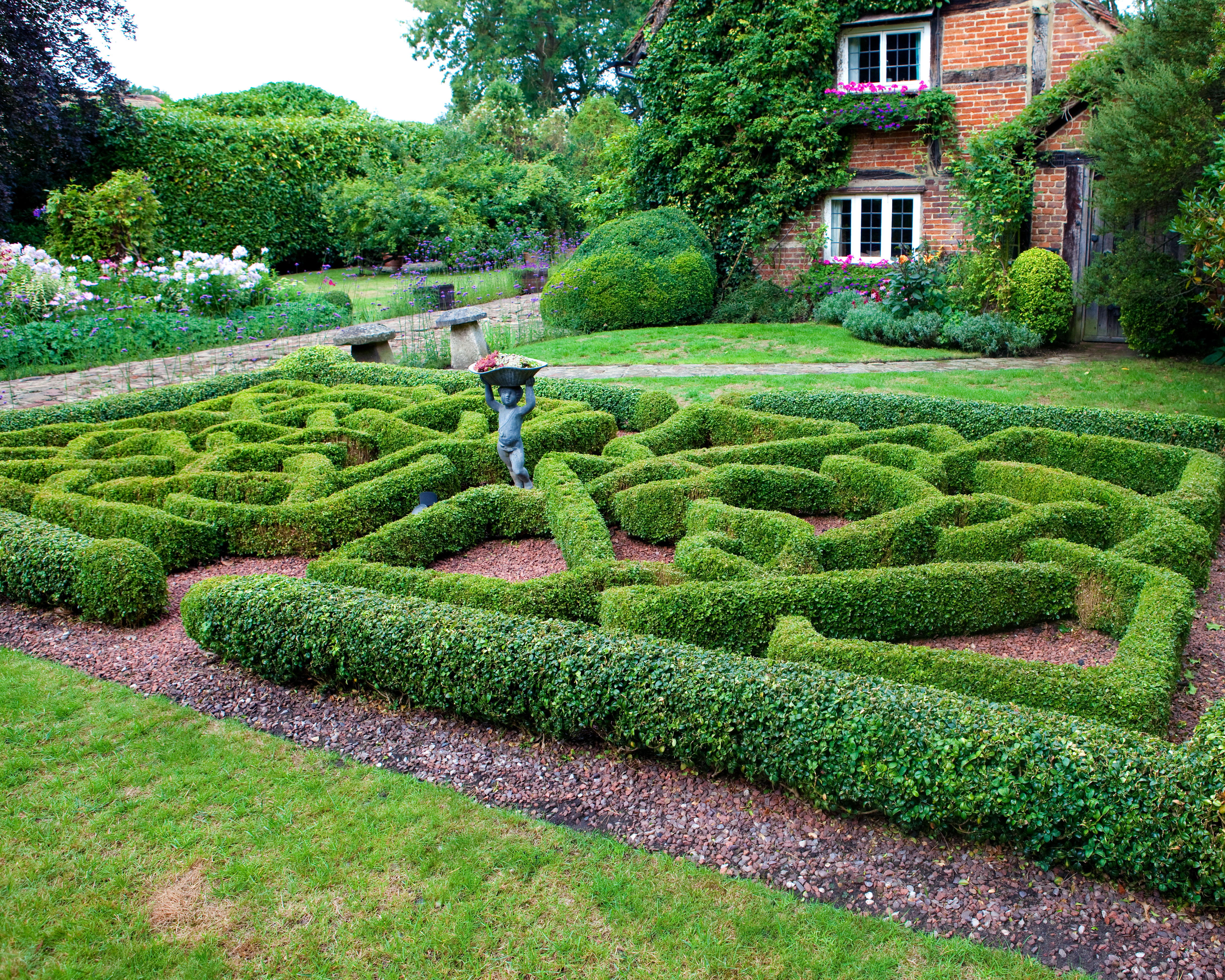
‘I love using evergreens to create a green structural pattern through the gardens I design. An evergreen framework provides harmony, balance and a rhythm to the garden,’ says Alice Ferguson.
'The art of creating structural framework with evergreens in a contemporary garden is an interesting theme to explore and key in anchoring the looser natural style planting fashionable at the moment,' she adds.
Formal French gardens made expert use of elaborate box parterres, but you can learn how to design a parterre garden to fit in with a contemporary scheme in gardens large and small.
While parterres were traditionally created with box, there are many other evergreens that you can use to create shapes. Try Pittosporum tenuifolium, Ilex crenata, Taxus baccata, or osmanthus as alternative evergreen shrubs.
5. Evergreen shrubs for colorful flowers
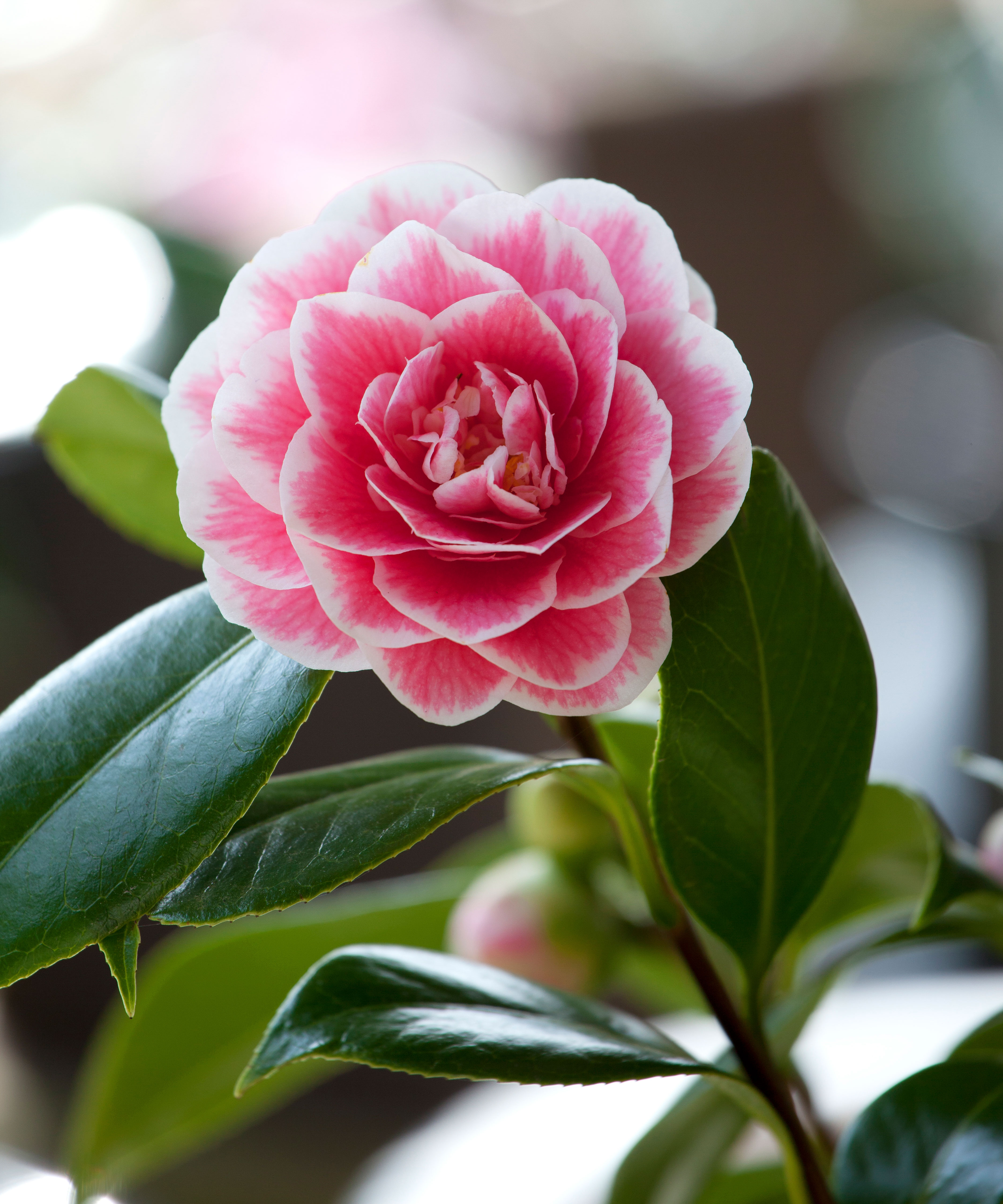
You can add highlights to back yard planting with flowering evergreen shrubs.
'The term ‘evergreen’ doesn’t mean that such plants only have green leaves. Rhododendron and nandina, for example, are evergreens, but they also have the advantage of flowering at different times of the year,’ explains Kate Gould.
'A dwarf camellia, such as Camellia sasanqua ‘Dwarf Shishi’, can be great for blooms in winter,' says Alice Ferguson
Camellia japonica, on the other hand, flowers from mid to late spring, is attractive to bees as one of the flowers good for wildlife garden ideas, 'and can be used as a specimen plant in a border, or as informal hedging,' explains Leigh Clapp.
6. Evergreen shrubs for variegated foliage
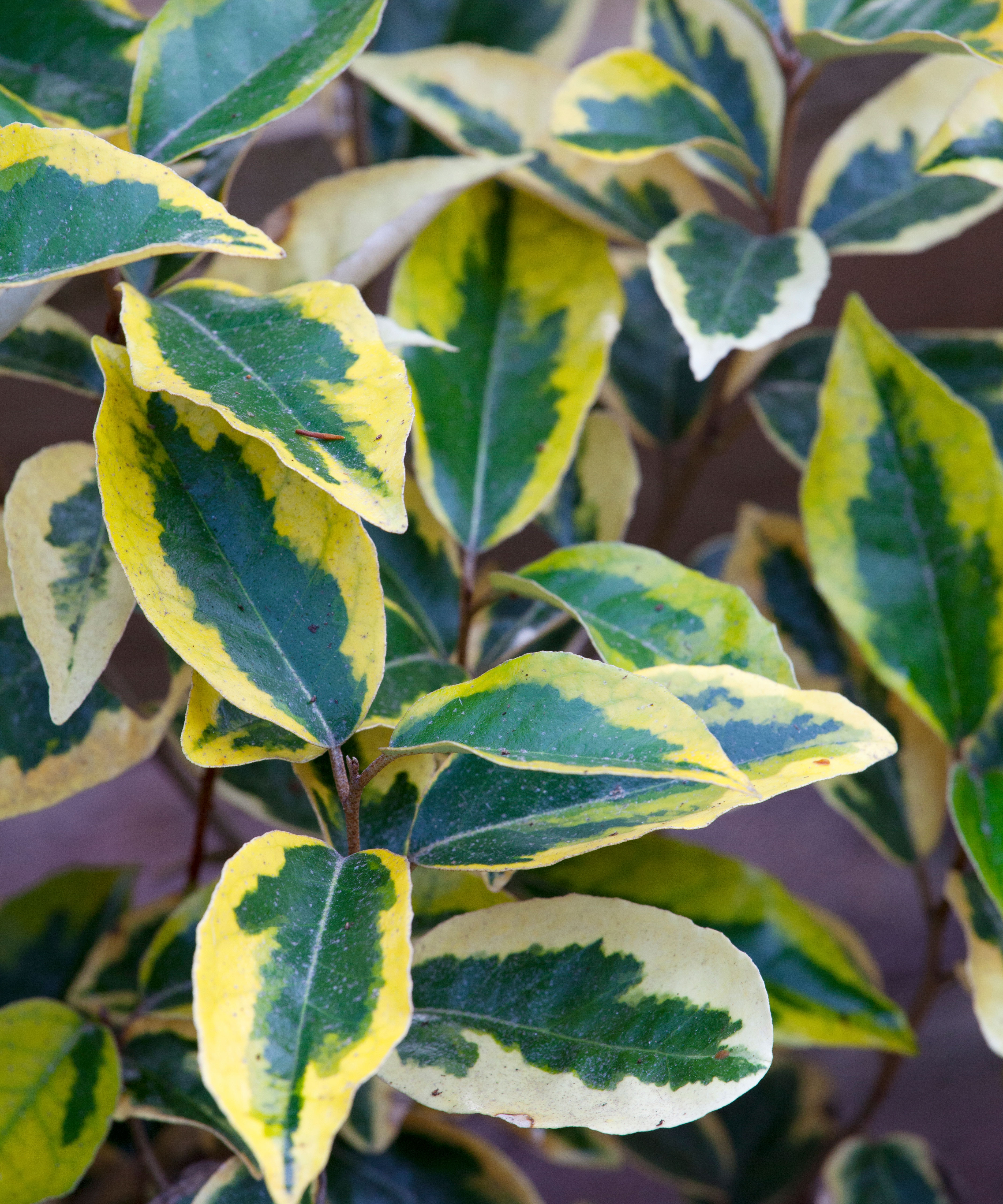
Evergreen shrubs with variegated foliage are very versatile.
'Some are subtle in combinations of green and white, ideal to light up a dark corner; others are showy with technicolor gold, orange, red and pink pigmentation as accents that pop against the dark green foliage,' explains garden writer Leigh Clapp.
'Glossy Eleagnus x ebbingei 'Gilt Edge' with its leaves of dark green centers and contrasting gold-coloured margins would light up a shady corner. Other variegated evergreen shrubs to try include pittosporum, hebe, coprosma, pieris, daphne and photinia,' advises Leigh Clapp.
7. Evergreen shrubs that change color through the seasons
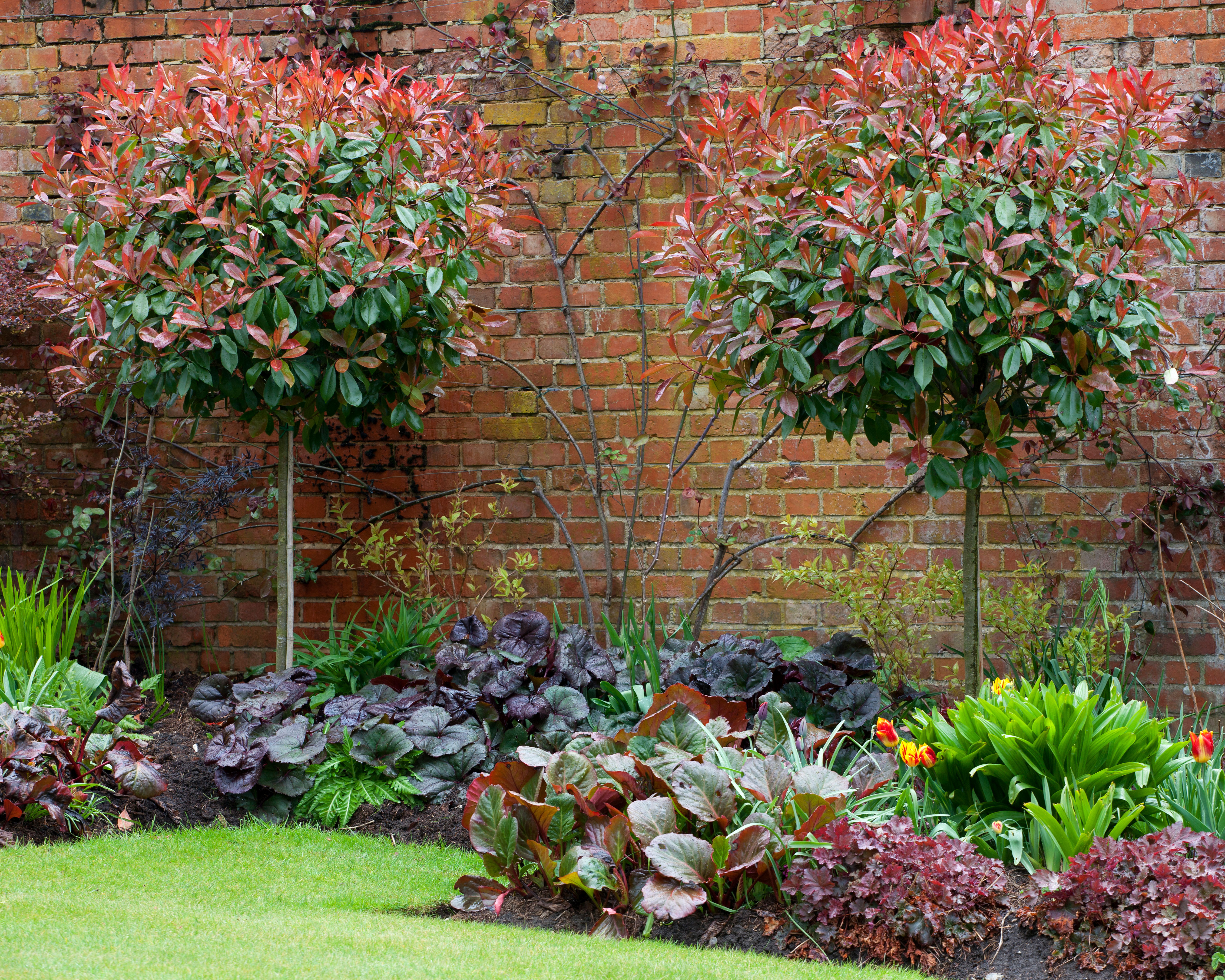
Some evergreen foliage also changes hues through the seasons.
To avoid looking too similar in swathes of green, choose varieties with different foliage size, that change color, or silver or variegated leaves.
Leigh Clapp highlights the following as good options for evergreen shrubs with color-changing foliage:
- Abelia, intensifies from lime green to dark green;
- Nandina, heavenly bamboo or sacred bamboo, goes from tints of red or purple to intense bright red in fall;
- Euonymus turns from dark green to dark purple in winter, providing a splash of color among a uniform palette;
- Photinia 'red robin' is prized for its vibrant red color of new-grown leaves, which go bronze-green as they mature. It's often used for a hedge or a border;
- Pieris japonica has vibrantly reddish pink new grown leaves.
8. Evergreen shrubs for fall and winter berries
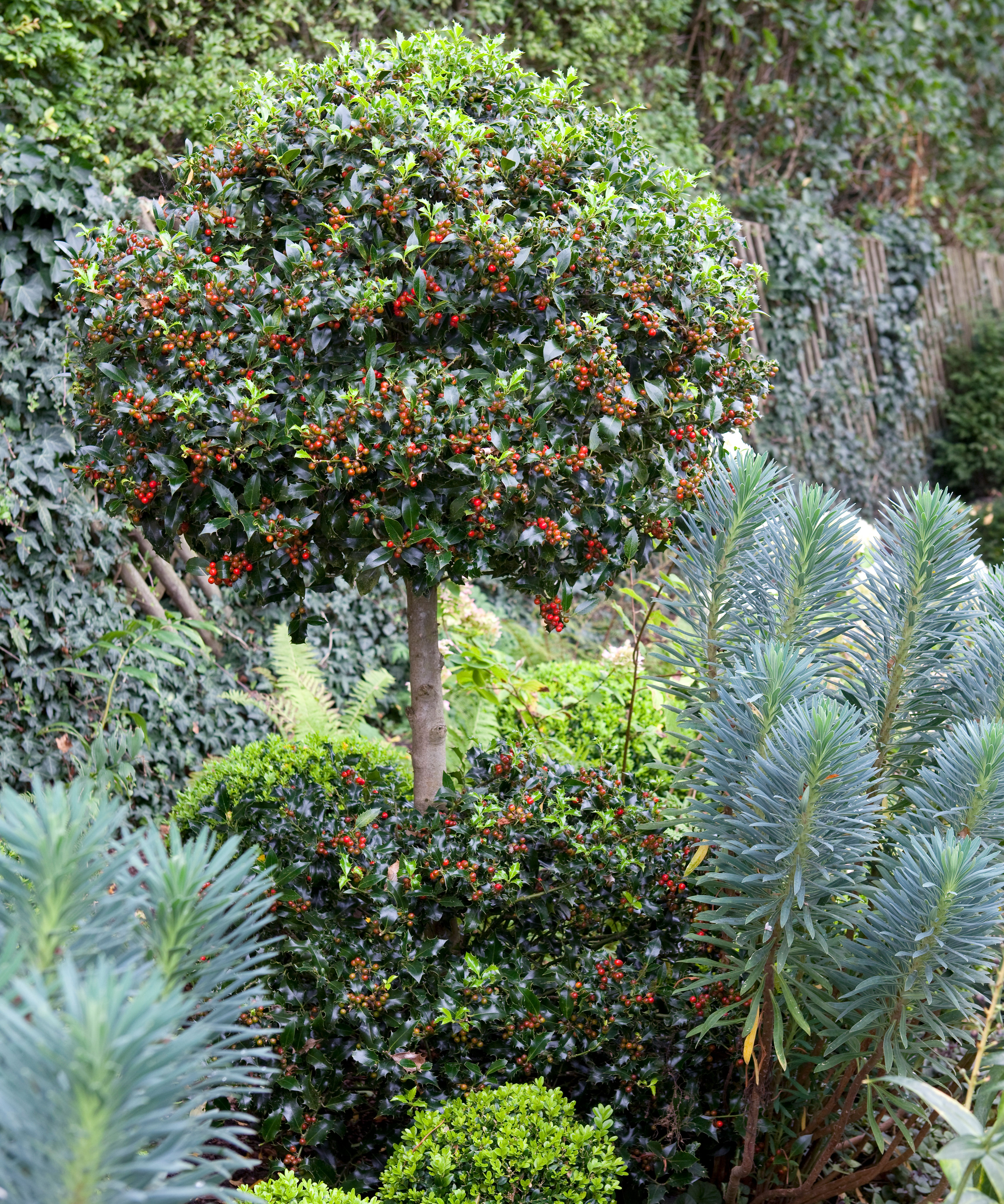
Some evergreen shrubs produce colorful and jewel-like berries in fall and winter that offer a visual delight, as well as providing a reliable food source for birds and wildlife.
Providing a food source for birds and other wildlife is among the ways to create an eco-friendly garden.
Ranging from pink to orange and red, there are many berry producing evergreen shrubs, including holly, berberis, cotoneaster, skimmia, yew and nandina.
9. Evergreen shrubs for scented flowers
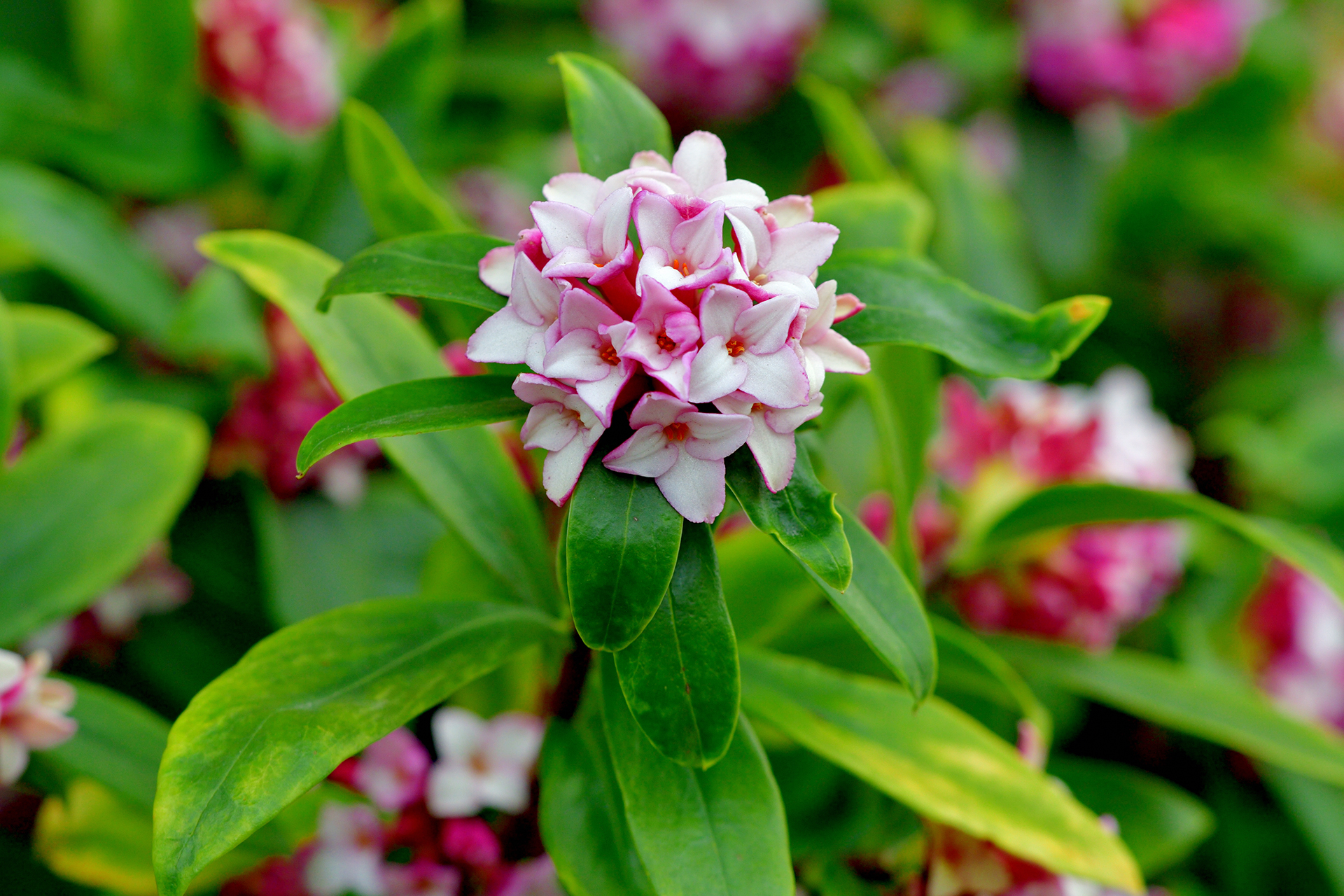
Though this is one of the prettiest evergreen plants, do not consider only the visual appeal of evergreen shrubs, but also bear in mind the wonderful scents that they can add to a garden planting scheme.
To create an outdoor area that has appeal through the seasons as well as a sensory garden full of scents, texture and colors to appeal to all of the senses, then add in some flowering evergreens.
Try Choisya with its highly scented flowers that appear in late spring; daphne pink and white blooms that appear in late winter or spring, sarcococca, and osmanthus with its jasmine like flowers.
10. Evergreen shrubs for pots
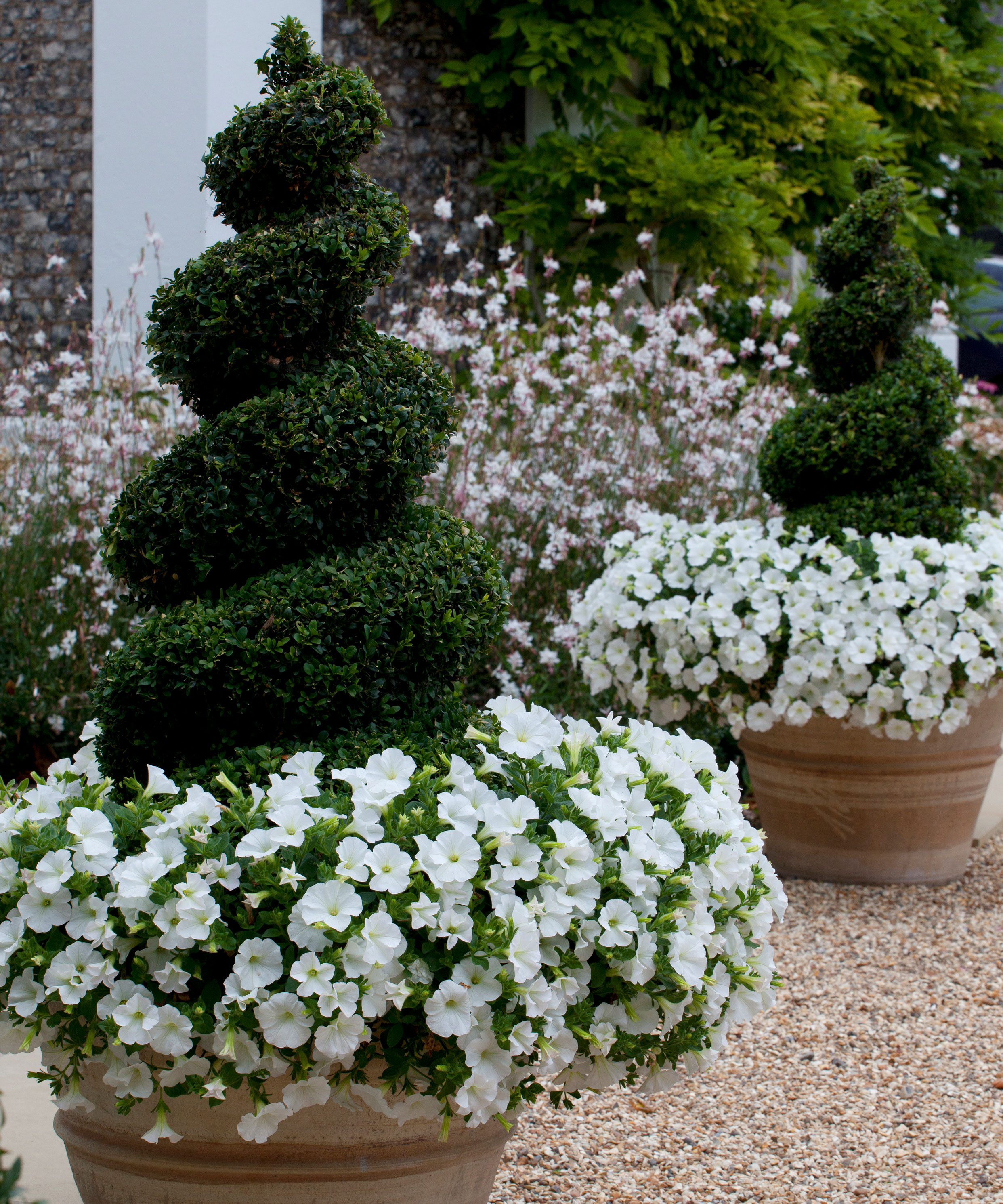
As part of your container garden ideas, you can create interest throughout the colder seasons with evergreens.
Evergreen shrubs provide year round planting structure in pots, and also require less day to day care than containers of annuals and perennials.
Use the largest planters you can find and you underplant the evergreen shrubs throughout the year with seasonal blooms.
Box, skimmia, camellia and dwarf conifers all do well as evergreen container plants.
Which are the most popular evergreen shrubs?
The most popular evergreen shrubs include those that add structure and privacy, but also color, shape and texture to a garden year round. These include fatsia, which has glossy, mid-green leaves; euonymous, perfect for hedges; photinia, which can be trained into pleasing round shapes; camellia, loved for its flowers; and lavender, perfect for scented containers.
What is the fastest-growing evergreen shrub?
The fastest-growing evergreen shrub will differ, depending on the zone you live in. However, one of the fastest is the Murray cypress tree, which can grow 4ft per year. Our list of fast-growing hedges includes hawthorn, which is great for wildlife; laurel – the perfect glossy boundary hedge; lilac, for fragrant blooms; and mock orange, with its beautiful scent.
Rachel is senior content editor, and writes gardening content for homesandgardens.com, Homes & Gardens magazine, and its sister titles Period Living Magazine and Country Homes & Interiors. She has written for lifestyle magazines for many years, with a particular focus on gardening, historic houses and arts and crafts, but started out her journalism career in BBC radio, where she enjoyed reporting on and writing programme scripts for all manner of stories. Rachel then moved into regional lifestyle magazines, where the topics she wrote about, and people she interviewed, were as varied and eclectic as they were on radio. Always harboring a passion for homes and gardens, she jumped at the opportunity to work on The English Home and The English Garden magazines for a number of years, before joining the Period Living team.
